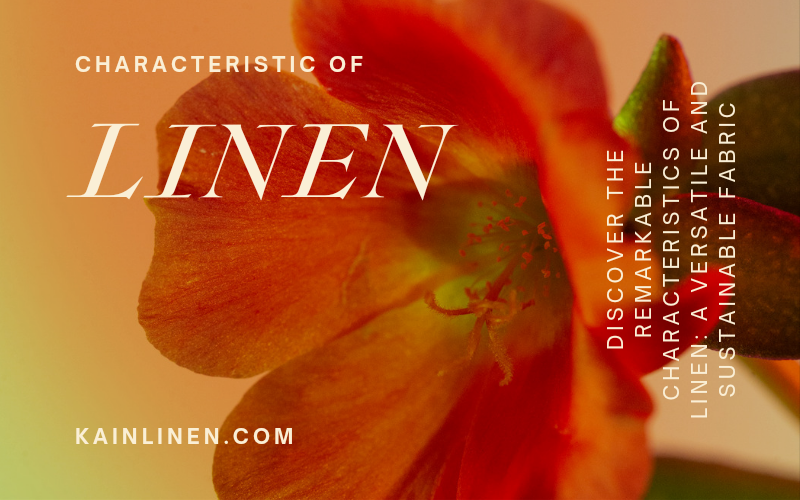Discover the Remarkable Characteristics of Linen: A Versatile and Sustainable Fabric
Explore the exceptional characteristics of linen fabric, including its breathability, durability, and eco-friendliness.
Discover why linen is a popular choice for clothing, home textiles, and upholstery.
Introduction to Linen
Linen, a natural fabric derived from the fibers of the flax plant, is highly regarded for its exceptional qualities.
This versatile and sustainable material possesses a range of characteristics that make it a popular choice for various applications.
From its breathability and durability to its eco-friendliness, linen stands out as a remarkable fabric that has been cherished for centuries.
Breathability and Comfort
One of the most notable characteristics of linen is its remarkable breathability. The unique structure of linen fibers allows for excellent airflow, making it an ideal fabric for warm weather.
Linen garments provide a cool and comfortable feel by allowing heat to escape from the body and absorbing perspiration.
Additionally, linen's moisture-wicking properties ensure that you stay dry even in humid conditions, promoting a comfortable and refreshing experience.
Durability and Longevity
Linen is renowned for its exceptional durability, making it a long-lasting investment.
Compared to other fabrics like cotton, linen fibers are two to three times stronger, which contributes to its resistance to wear and tear.
Linen's inherent strength ensures that garments and linens made from this fabric retain their shape and integrity over time. With proper care, linen products can withstand the test of time, making them a sustainable choice.
Timeless Elegance and Softness
While linen initially possesses a slightly stiff texture, it becomes softer and more supple with each use and wash. This unique characteristic gives linen garments a distinct, lived-in feel that adds to their charm.
The fabric develops a delicate drape and graceful wrinkles, which are embraced as part of its natural appeal. Linen's timeless elegance and softness make it a sought-after choice for both casual and formal attire.
Eco-Friendliness and Sustainability
Linen is considered an eco-friendly fabric due to its sustainable production process. Flax, the plant from which linen is derived, requires fewer pesticides and water compared to other fiber crops like cotton.
It also grows more quickly, making it a renewable resource. Linen production has minimal impact on the environment, and the flax plant's cultivation helps improve soil quality. Choosing linen supports sustainable and responsible textile practices.
Versatility and Applications
Linen's versatility is another distinguishing characteristic. It finds applications in a wide range of products, including clothing, home textiles, and upholstery.
Linen garments are cherished for their comfort and breathability, while linen beddings, tablecloths, and curtains bring a touch of elegance and sophistication to homes.
The fabric's durability also makes it suitable for upholstery, where it adds a timeless aesthetic to furniture.
Conclusion
In conclusion, linen fabric's remarkable characteristics set it apart as a versatile and sustainable choice for various purposes. Its breathability, durability, and ability to soften with use make it a comfortable and long-lasting option.
Linen's eco-friendliness, along with its timeless elegance and versatility, makes it highly desirable for both personal and interior design applications. Embrace the exceptional qualities of linen and experience the unique charm of this remarkable fabric.

Posting Komentar untuk "Discover the Remarkable Characteristics of Linen: A Versatile and Sustainable Fabric"